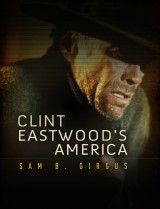Details

Clint Eastwood's America
America Through the Lens 1. Aufl.
|
16,99 € |
|
| Verlag: | Wiley |
| Format: | EPUB |
| Veröffentl.: | 08.01.2014 |
| ISBN/EAN: | 9780745656489 |
| Sprache: | englisch |
| Anzahl Seiten: | 188 |
DRM-geschütztes eBook, Sie benötigen z.B. Adobe Digital Editions und eine Adobe ID zum Lesen.
Beschreibungen
The steady rise of Clint Eastwood’s career parallels a pressing desire in American society over the past five decades for a figure and story of purpose, meaning, and redemption. Eastwood has not only told and filmed that story, he has come to embody it for many in his public image and film persona. Eastwood responds to a national yearning for a vision of individual action and initiative, personal responsibility, and potential for renewal. An iconic director and star for his westerns, urban thrillers, and adventure stories, Eastwood has taken film art to new horizons of meaning in a series of masterpieces that engage the ethical and moral consciousness of our times, including <i>Unforgiven</i>, <i>Million Dollar Baby</i>, and <i>Mystic River</i>. He revolutionized the war film with the unprecedented achievement of filming the opposing sides of the same historic battle in <i>Flags of Our Fathers</i> and <i>Letters from Iwo Jima</i>, using this saga to present a sharply critical representation of the new America that emerged out of the war, a society of images and spectacles.<br /> <br /> This timely examination of Clint Eastwood’s oeuvre against the backdrop of contemporary America will be fascinating reading for students of film and popular culture, as well as readers with interests in Eastwood’s work, American film and culture.
<p>Acknowledgments viii</p> <p>Abbreviations xii</p> <p>Introduction: Eastwood’s America – From the Self to a World View 1</p> <p>1 The First Twenty Years: Borderline States of Mind 24</p> <p>2 Unforgiven: The Search for Redemption 70</p> <p>3 Mo Cuishle: A New Religion in Million Dollar Baby 116</p> <p>4 Cries from Mystic River: God, Transcendence, and a Troubled Humanity 172</p> <p>5 Flags of Our Fathers/Letters from Iwo Jima: History Lessons on Time and the Stranger 231</p> <p>Notes and References 284</p> <p>Index 301</p>
<p>''No other book on Clint Eastwood comes close to what Sam Girgus accomplishes here in assessing Eastwood’s remarkable - and wholly unexpected - maturation as a film-maker and narrative artist, and his increasingly complex and sophisticated treatment of social, ethical, interpersonal, and gender-related issues. Indeed, Girgus builds a case for Eastwood’s emergence since the early 1990s as America’s consummate auteur - a film-maker who has taken far greater risks and has made far more significant and memorable films over the past two decades than any other Hollywood director.''<br /> <b>Thomas G. Schatz, The University of Texas at Austin</b></p> <p>''This book marks a long-awaited appreciation of the complexity of Eastwood’s directorial and moral vision. Starting with Unforgiven, Eastwood’s main characters have been engaged in a search for meaning, called upon by the voice of the other to perform a ritual sacrifice on behalf of that other that thereby delivers to the hero a sense of purpose. Invoking Levinas and Kristeva, Girgus demonstrates the evolution of the Eastwood hero from self-sufficient loner to a being entangled in relationships, who challenges the ethical and moral order of thinking and living in today’s uncertain world.''<br /> <b>John Belton, Rutgers University</b></p> <p>''Girgus sharpens his ongoing scholarship on cinema and ethics with this thought-provoking analysis of the films of Clint Eastwood. Eastwood has evolved into arguably the most conflicted and divisive icon in American cinema, reflecting an oceanic career that rocks with waves of various social, political, and cultural influences and positions. In a historical moment when Hollywood and American society at large are in the throes of rupture and self-redefinition, Girgus offers us a timely and crucial survey of the ultimate symbol of what is best and worst about a national ideology and its film culture.''<br /> <b>Hunter Vaughan, Oakland University</b><br /> </p>
Sam Girgus is professor of English at Vanderbilt University.
<p>''No other book on Clint Eastwood comes close to what Sam Girgus accomplishes here in assessing Eastwood’s remarkable - and wholly unexpected - maturation as a film-maker and narrative artist, and his increasingly complex and sophisticated treatment of social, ethical, interpersonal, and gender-related issues. Indeed, Girgus builds a case for Eastwood’s emergence since the early 1990s as America’s consummate auteur - a film-maker who has taken far greater risks and has made far more significant and memorable films over the past two decades than any other Hollywood director.''<br /> <b>Thomas G. Schatz, The University of Texas at Austin</b></p> <p>''This book marks a long-awaited appreciation of the complexity of Eastwood’s directorial and moral vision. Starting with Unforgiven, Eastwood’s main characters have been engaged in a search for meaning, called upon by the voice of the other to perform a ritual sacrifice on behalf of that other that thereby delivers to the hero a sense of purpose. Invoking Levinas and Kristeva, Girgus demonstrates the evolution of the Eastwood hero from self-sufficient loner to a being entangled in relationships, who challenges the ethical and moral order of thinking and living in today’s uncertain world.''<br /> <b>John Belton, Rutgers University</b></p> <p>''Girgus sharpens his ongoing scholarship on cinema and ethics with this thought-provoking analysis of the films of Clint Eastwood. Eastwood has evolved into arguably the most conflicted and divisive icon in American cinema, reflecting an oceanic career that rocks with waves of various social, political, and cultural influences and positions. In a historical moment when Hollywood and American society at large are in the throes of rupture and self-redefinition, Girgus offers us a timely and crucial survey of the ultimate symbol of what is best and worst about a national ideology and its film culture.''<br /> <b>Hunter Vaughan, Oakland University</b></p>


















